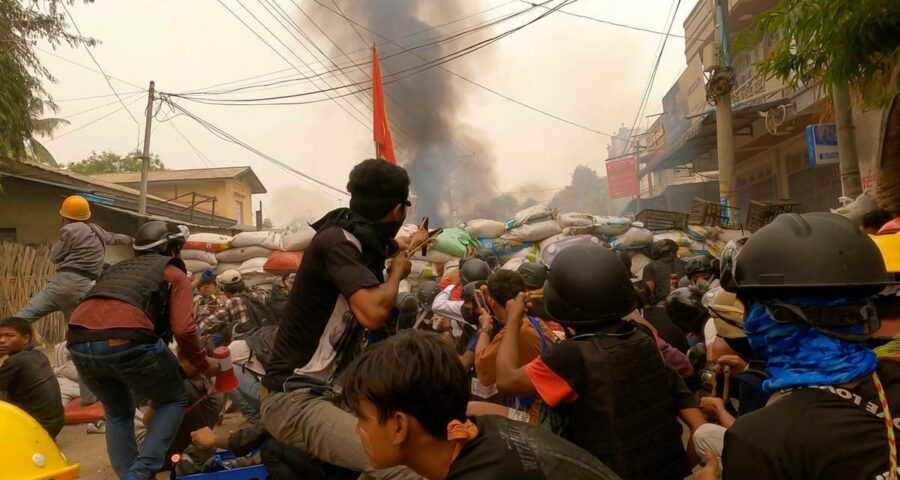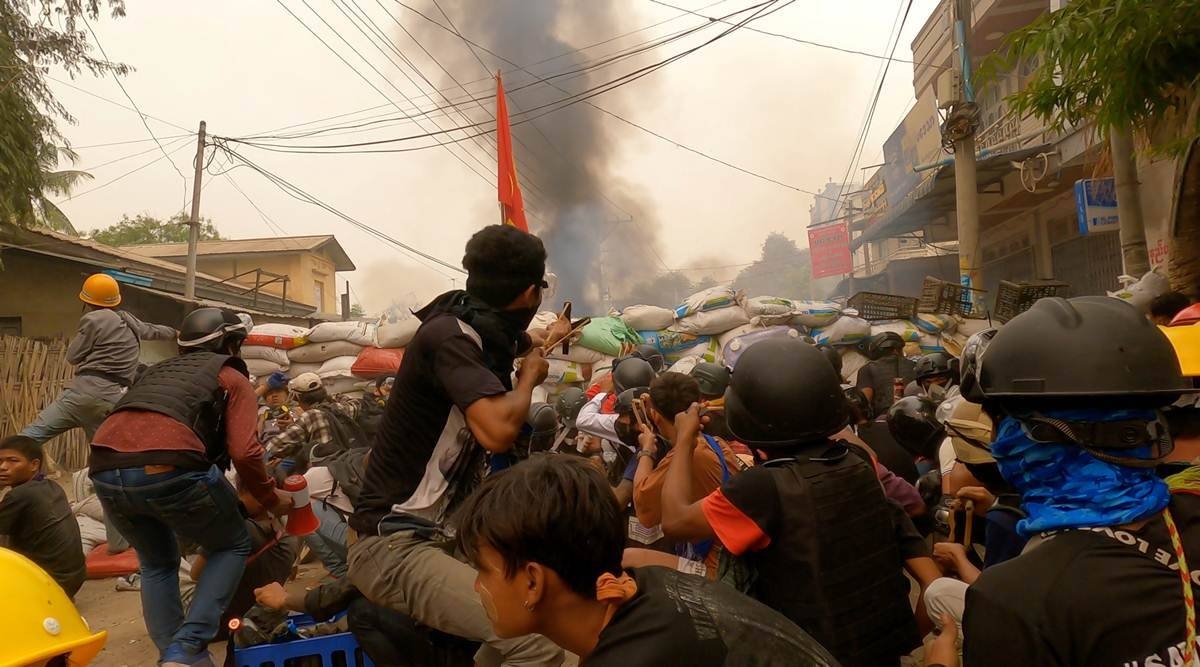By sidelining even the most basic humanitarian impulses in its response to Myanmar crisis, India will neither realise its ideals nor its strategic objectives.
Get email alerts for your favourite author. Sign up here
The unfolding tragedy in Myanmar, occasioned by the military (the Tatmadaw) overturning the election results last month, portends a new cycle of political repression, humanitarian disaster and geopolitical instability. India, because of its proximity to Myanmar, its geopolitical role, and its interests, will inevitably be drawn into the train of events. The most immediate challenge is, of course, dealing with the refugee crisis that this coup occasions. The Chief Minister of Mizoram, Zoramthanga, was correct in writing to the Centre that India cannot ignore the humanitarian crisis unfolding in our backyard, and remain “indifferent” to the suffering of those crossing the border. The Manipur government has, thankfully, withdrawn a shameful circular that would have prohibited providing meaningful assistance to victims of political persecution. This circular, if enacted, would have been terrible for India’s image. But how we deal with the victims of this crisis should not be just driven by an exercise in image management, but take the larger humanitarian and political view.
To state that the rich and powerful nations have not pulled their weight in crafting an adequate multilateral response to the global refugee crisis is to state the obvious. Myanmar’s other neighbours, and especially ASEAN countries, are also unlikely to do the minimal decent thing. Helping refugees is also not costless, and the burden has to be shouldered by the nation, not just a few states. But India now risks moving from what B S Chimni, India’s most important scholar on refugee law, once called the transition from “strategic ambiguity to exclusion”. This is in keeping with the ideological temper of our times, where the complexities of people’s very human predicaments are effaced by xenophobia, paranoia, and discrimination. No group that is not of use to our new interpretation of nationalism will deserve any consideration.
The humanitarian case for providing some kind of safe haven for refugees is too obvious to be stated. Surely the real test of “Vasudhaiva Kutumbakam” is not opportunistic displays of noblesse oblige, it is adherence to basic norms of decency. The principle of non-refoulement, which has been described as the equivalent of the Magna Carta in treatment of those fleeing persecution, has to be the cornerstone of any civilised state’s response to a politically induced humanitarian disaster. It is not clear where India stands on this.
But there is also a more political case for crafting a more generous and imaginative policy. First, the protests for democracy are widespread, involve young people, and are driven by a genuine opposition to military rule. India has to decide whether it is on the side of the future. Second, Northeastern states like Manipur and Mizoram which will immediately bear the costs of helping refugees, are all, rightly, calling for a more generous and imaginative policy. As Avinash Paliwal, one of the most insightful writers on Myanmar, had argued in an important article, “A Cat’s Paw of Indian Reactionaries: Strategic Rivalry and Domestic Politics at the India-China-Myanmar Tri Junction,” the concerns of the Northeast states have often been historically sidelined in India’s handling of the “trijunction”. This was partly because of counterinsurgency fears, and partly because of suspicion of political forces in the Northeast. But at this historical juncture, to ignore reasonable and accommodative sentiments in the Northeast, would be to potentially signal their marginality in shaping India’s calculations. Third, the counterinsurgency and subversion fears have to be intelligently handled. For one thing, if we are relying only on cooperation with the Myanmar military, without support for the local population, we will once again be setting ourselves up for long-term problems. A broadbased reputation for humanitarian concerns and the welfare of people is a strategic asset, not a liability if you are a long-term player. India should also now have the confidence that it can both politically and militarily handle any risks that occasionally arise in the context of doing the decent thing. But by closing down its borders, it is not sending a signal of strength but one of weakness; that its position is so fragile, that even an adherence to a principle of non-refoulement poses risks.
Fourth, it is not yet clear what India’s position on political developments inside Myanmar will be. With every major power, from Russia to China now seeing Myanmar in terms of geopolitical terms, the stakes for India are going to be high. Admittedly, the choices are not easy. The Myanmar military, belying all analyses, has remained mostly united and oppressive. We know from historical experience that unless there is significant elite division in military structures, they can hang on for a long time through brutal repression. Myanmar’s tragedy seems to be that its people seem more ready for democracy. But its military seems more repressive, and its elites, including Aung San Suu Kyi, have been more conservative in harnessing democratic and progressive impulses. There is also the brute fact that now with even Russia in the mix, the Myanmar military may have more options for support. So under such circumstances, it will be tempting for the so-called realists in India to deeply engage with the military. There is also a great deal of exaggeration about Myanmar’s economic importance to India. Certainly, connectivity and trade with Myanmar provide momentum for India’s eastward interests. But frankly, it will be a stretch to say that somehow the benefits from engagement with Myanmar are so great that India cannot put them aside, if the need arises, to act on a modicum of principle.
Presumably, India wants to be a key interlocutor in two contexts. It wants to be a key player in shaping a global response to the crisis. And it wants to have, perhaps, some role in, if possible, helping with a settlement towards a less repressive transition within Myanmar. But for both of those roles, it is important that India has widespread credibility with the different groups and movements inside Myanmar. That is what will give India potential advantage. But it is also important that your own positions are not seen just as a product of strategic cynicism, willing to trade any larger consideration for small short-term gains. For both of these contexts, the exemplariness of India’s conduct matters. That is how we differentiate ourselves from the crowded geopolitical pack. By sidelining even the most basic humanitarian impulses, under a myopically realist or xenophobic impulse, India will neither realise its ideals nor its strategic objectives.
This article first appeared in the print edition on March 31, 2021 under the title ‘On the side of the future’. The writer is contributing editor, The Indian Express
Source: Read Full Article



